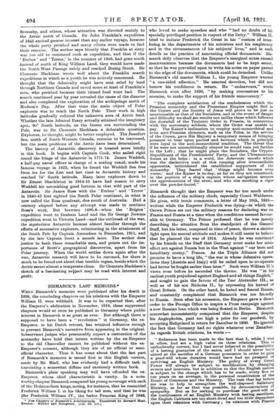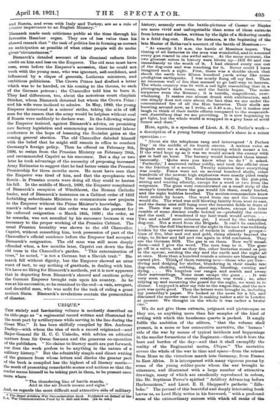'BISMARCK'S LAST MEMOIRS.*
WIMN Bismarck's memoirs were published after his death in 1898, the concluding-chapters on his relations with the Emperor William H. were withheld. It -was to be expected -that, after the Emperor's abdication in November, 1918, -these suppressed chapters would at once be published in Germany where public interest in Bismarck is as great as ever. But although there is supposed to have been a " revolution " in Germany, the ex- Emperor, in his Dutch retreat, has retained influence enough to prevent Bismarck's narrative from appearing in the original. Subservient judges who presumably expect a restoration of the monarchy have held that letters written by the ex-Emperor to the old Chancellor cannot be published without the ex- Emperor's consent, although they are of an official or semi- official character. Thus it has come about that the last part of Bismarck's memoirs is issued first in this English version, made by Mr. Miall, who has evidently had a difficult task in translating a somewhat diffuse and carelessly written book.
Bismarck's plain speaking may well have offended the ex- Emperor, whose ohief characteristic is vanity. In a note- worthy chapter Bismarck compared his young sovereign with each of the Hohenzollern kings, noting, for instance, that he resembled Frederick William L in his liking for tall men, and that he was like Frederick William IV., the feeble Prussian King of 1848, • New Chapters of Bismarck's Autobiography. Translated by Bernard Mall. London : Hodder and Stoughton. 112s. ed. net.j
who loved to make speeches and who " had no doubt of hit specially privileged position in respect of the Deity." William Ti.
tried to -imitate Frederick the Great in. his " custom of inter. -feting in the departmenta of his ministers and his magistracy and in , the circumstances of his subjects' lives," and in such details as the practice of annotating official documents: Bis- marck drily observes that the Emperor's marginal notes caused inconvenience because the- documents had to be kept- secret, so that he was prevailed upon to write his notes on paper pasted to the edge of the documents, which could be detached. Unlike Bismarck's old master William L, the young Emperor wanted ".a one-sided affection." He -exacted devotion, but did not bestow his confidence in return. 'He " endeavours," wrote Bismarck soon after 1890, " by making concessions to his enemies, to make the support of his friends unnecessary."
" The complete satisfaction of the confederates which the Prussian monarchy and the Protestant Empire might find in the Centre and the Society of Jesus will prove to -be just as unattainable as that of the Socialists, and in the event of danger and difficulty we shall see results not unlike, those which followed the downfall of the Teutonic Order in Prussia, in connection with the mercenary soldiers, whom the Order -was unable to pay. The Kaiser's inclination to employ anti-monarchical and even anti-Prussian elements, such as the Poles, in the service of the Crown, gave His Majesty a temporary means of bringing pressure to bear upon parties and factions which in principle were loyal to the anti-monarchical tradition. The threat that if he were not unconditionally obeyed he would turn yet further to the Left ; that he might place the Socialists, the Crypto- Republicans of the Freethinkers' Party, and the Ultramontane forces at the helm : in a word, the Acheronta movebo which was the distinctive trait of this running after irreconcilable opponents, intimidated the established supporters of the monarchy. They feared that ' things might become even worse,' . and the Kaiser is to-day, as far as they are concerned, in the position of a ship's captain whose navigation arouses the apprehensions of the crew, and who site smoking a cigar over the powder-barrel."
Bismarck thought that :the Emperor was far too much under the influence of the military chiefs, especially Count Waldersee. He gives, with ironic comments, a letter of May 10th, 1888—
written while the Emperor Frederick was dying—in which the Crown Prince set out the military reasons for declaring war on France and Russia at a time when the conditions seemed favour- able to Germany. The Prince professed that he was merely describing the situation from the standpoint of the General Staff, but his letter, composed in time of peace, throws a sinister light upon his mental attitude and makes it still easier to believe that he planned the war of 1914. Already he was convinced by his friends on the Staff that Germany must make her main effort not against Russia but in the West against " our born and hereditary enemy," France. As the Triple Alliance did not promise to have a long life, " the war in whose- defensive opera- tions they [Austria and Italy] will be called upon to co-operate had-better be fought earlier than later." .Suoh were William II.'s views even before he ascended -the throne. He was " in his earliest youth prejudiced against. England and all things English," and sought to gain the favour of the Tsar Alexander IlL, as well as of his son Nicholas II., by expressing his hatred of Great Britain. On the other hand, he hated and feared Russia, and constantly complained that Bismarck was too friendly to Russia. Soon after his acoession,_ the Emperor gave a direct order to the Foreign Office -to inspire a- Press campaign against a new Russian loan which was beinglioated in Berlin. Bismarck
somewhat inconsistently oompained that .the Emperor, despite his Anglophobia, paid too high a price for, our goodwill, by
accepting Heligoland in return for Zanzibar in 1890. He ignored the fact that Germany had no rights whatever over. Zanzibar. As regards British relations, he -wrote
Reference has been made to the-fact. that I, while I was in office, had set a high value on • these relations. This is undoubtedly correct, but I had never believed in the possibility of a lasting guarantee of the same, and I should never have aimed at the sacrifice of a German possession in order to gain a good-will whose duration would have had no prospect of surviving an English Ministry. The _policy of every Greet Power will always be subject to modification by changing events and interests, but in addition to this the English nation is subject to the change which has to be made, every five or ten years on an average, in the personal constitution of the House of Commons and the Ministry. The teak that lay before me was to help to strengthen the well-disposed Salisbury Ministry, as far as that was possible. by demonstrations of sympathy. But as for seeking to purchase the good-will or the continuance of an English Ministry with lasting _sacrifices, the F.ngliah Cabinets are too short-lived and too little dependent upon their relations with Germany ; its relations with France
end Russia, and even with Italy and Turkey, are as a rule of greater importance to an_ English Ministry."
Bismarck made- =oh criticisms public at the time through his favourite Hambur : organ. They are of less value than his shrewd remark that " the task of politics lies in forming as correct an anticipation as possible of what other people will do under given 'circumstances."
Bismarck's detailed account of his dismissal reflects little credit on him and less on the Emperor. The old man must have seen, even before the Emperor's aocesaion, that he could not- work with the young man, who was ignorant, seltoonfident, and influenced by a clique, of generals,--Lutheran ministers, and ambitious politicians.- The Crown Prince had drafted. a letter which was to be handed, on his coming to the throne, to each of the German princes ; the Chancellor told him to burn it. They had differences, too, about the notorious court chaplain Stocker, whom Bismarck detested but whom the Crown Prints! and his wife were inclined to admire. In May, 1889, the young Emperor intervened in a miners' strike, taking the side of th men for the reason that the army would be helpless without coal if Russia were suddenly to declare war. In the following winter the Emperor insisted, against Bismarck's advice, on promising new factory legislation and summoning an international labour conference in the hope of lessening the Socialist gains at the coming general election. The old Chancellor deluded himself with the belief that he might still remain in office to conduct Germany's foreign policy. Then he offered on February 9th, 1890, to resign from the Prussian Ministry on February 20th, and recommended Caprivi as his successor. But a day or two later he took advantage of the necessity of proposing increased Army Estimates to suggest that he had better retain the Prussian Premiership for three months more. He must have seen that the Emperor was tired of him, and that the sycophants who flouris . in Prussian courts were doing all they could to hasten his fall. In the middle of March, 1890, the Emperor complained of Bismarck's reception of Windthorst, the Roman Catholio leader, and of Bismarck's insistence on a Cabinet order of 1852 forbidding subordinate Ministers to communicate new projects to the Emperor without the Prime Minister's knowledge. Bis- marck's refusal to annul this order was made the pretext for his enforced resignation n March 18th, 1890 ; the order, as he remarks, was not annulled by his successor because it was necessary to the proper working of the Prussian Cabinet. The usual Prussian brutality was shown to the old Chancellor. Caprivi, without consulting him, took possession of part of the Chancellor's official residence before the Emperor had accepted Bismarck's resignation. The old man was still more deeply offended when, a few months later, Caprivi cut down the fine old trees in the Chancellor's garden. " This extermination of trees," he noted, " is not a German but a Slavish trait." Bis- marck fell without dignity, but the Emperor showed an utter want of tact, to say nothing of gratitude, in dealing with him. We have no liking for Bismarck's methods, yet it is now apparent that in departing from Bismarck's shrewd and cautious policy the German Emperor brought ruin upon his country. As he was at his succession, so he remained to the end—a vain, arrogant, and deceitful man, who was unfit for the task of ruling a great modern State. Bismarck's revelations contain the premonition of disaster.



































 Previous page
Previous page